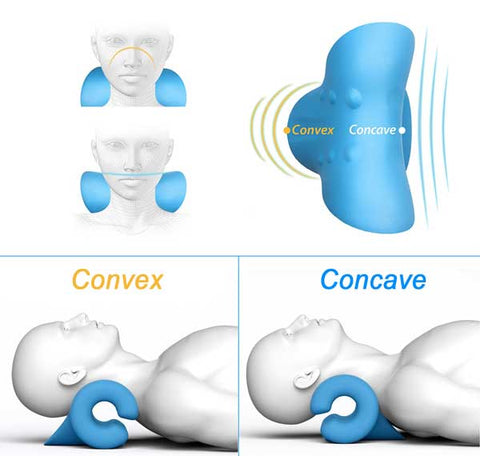Neck Cloud Testimonial: A Revolutionary Device for Neck and Spinal Column Health And Wellness
Neck Cloud Testimonial: A Revolutionary Device for Neck and Spinal Column Health And Wellness
Blog Article
The Impact of Tension on Neck Discomfort: Methods for Decreasing Stress and Discomfort
In today's fast-paced world, it's no secret that tension has actually become a prevalent element in the onset and exacerbation of neck pain. Join us on a journey to decipher the effect of anxiety on neck discomfort and discover reliable methods to relieve pain and boost overall quality of life.
Understanding Stress-Related Neck Pain
Neck discomfort is a common issue that can commonly be credited to tension. Stress-related neck discomfort can show up as stress, stiffness, or pain in the neck and shoulder location. The link between tension and neck discomfort hinges on the body's physiological reaction to tension, which can lead to muscle mass stress and rigidity in the neck muscular tissues. Chronic anxiety can bring about relentless neck pain and worsen present problems like cervical spondylosis or muscle strains.

Identifying Common Stress Areas
Frequently experienced by individuals under stress and anxiety, tension locations in the body can provide useful insights into the physical indications of psychological stress. One usual tension area is the neck, where stress and anxiety typically shows up physically. Stress headaches, rigid neck muscular tissues, and restricted variety of activity prevail symptoms of stress-related neck stress. The shoulders are an additional common location where tension builds up. Stress and anxiety can cause the muscle mass in the shoulders to tighten up, bring about discomfort and pain. In addition, the upper back is prone to stress accumulation, especially in individuals who experience chronic stress and anxiety. Poor posture and prolonged sitting can worsen stress around. The jaw is also a common place for stress-related stress, as several individuals squeeze their jaw or grind their teeth when stressed. Being aware of these typical stress locations can aid people identify the physical signs of stress and take steps to resolve them prior to they rise into chronic pain or discomfort.
Applying Leisure Techniques
To efficiently manage stress-related stress in the body, carrying out relaxation techniques is crucial. Leisure methods are important tools for reducing neck discomfort brought on by tension. Deep breathing workouts can assist calm the mind and relax stressful muscle mass in the neck and shoulders (neck cloud). Practicing mindfulness reflection can also be advantageous in alleviating stress and anxiety and promoting leisure. Modern muscle leisure, where you systematically strained and afterwards loosen up different muscle groups, can release built-up tension in the neck area. Additionally, activities like yoga and tai chi integrate both physical motion and relaxation, making them reliable techniques for decreasing tension and neck discomfort. Taking regular breaks throughout the day to stretch and loosen up can avoid muscle mass stiffness wikipedia reference and stress from collecting. By incorporating these relaxation techniques right into your day-to-day regimen, you can aid take care of stress levels, reduce tension in the neck, and relieve discomfort related to stress-induced neck discomfort.
Incorporating Self-Care Practices
Including self-care methods is important for preserving overall health and handling stress-related neck discomfort efficiently. Taking part in regular physical activity, such as mild stretching exercises or yoga exercise, can assist reduce stress in the neck and shoulders. Practicing great posture throughout the day and taking constant breaks from long term sitting or display time can also protect against strain on the neck muscles.
Additionally, focusing on adequate rest and establishing a constant sleep routine can add significantly to minimizing tension degrees and advertising leisure. Producing a calming bedtime routine, such as reading a publication or taking a warm bathroom, can help prepare the body and mind for relaxing sleep. In addition, keeping a balanced diet regimen rich in nutrients and remaining hydrated can sustain total health and wellness and minimize inflammation that might exacerbate neck pain.
Incorporating mindfulness practices, such as deep breathing exercises or reflection, can assist manage anxiety and promote leisure. Taking some time for oneself, participating in hobbies, and establishing boundaries to shield personal time are likewise important aspects of self-care that can contribute to reducing stress and relieving neck pain.
Looking For Expert Help
How can people properly resolve relentless neck pain that is impacting their everyday life and health? Looking for professional assistance can be a vital action in managing and easing neck pain. Consulting with medical care professionals such as chiropractic specialists, physiotherapists, or orthopedic experts can give useful insights and customized therapy strategies. These professionals can conduct thorough assessments to detect the underlying sources of neck discomfort and advise proper interventions.
Chiropractors focus on spine control methods to enhance placement and minimize stress in the neck area. Physiotherapists offer targeted workouts and stretches to enhance muscles, enhance flexibility, and enhance overall neck function. Orthopedic professionals can supply sophisticated clinical interventions such as injections or medical options for read review serious situations of neck pain.
Verdict

Stress-related neck pain can manifest as stress, stiffness, or pain in the neck and shoulder area. The link in between stress and anxiety and neck discomfort lies in the body's physiological reaction to stress and anxiety, which can result in muscular tissue stress and tightness in the neck muscle mass. Stress migraines, stiff neck muscle mass, and limited range of movement are usual signs of stress-related neck tension. By including these leisure methods into your daily regimen, you can assist manage tension degrees, reduce stress in the neck, and read this alleviate pain connected with stress-induced neck pain.

Report this page